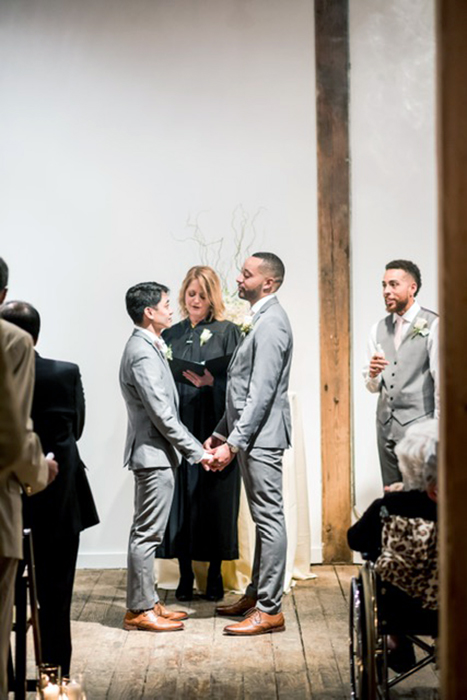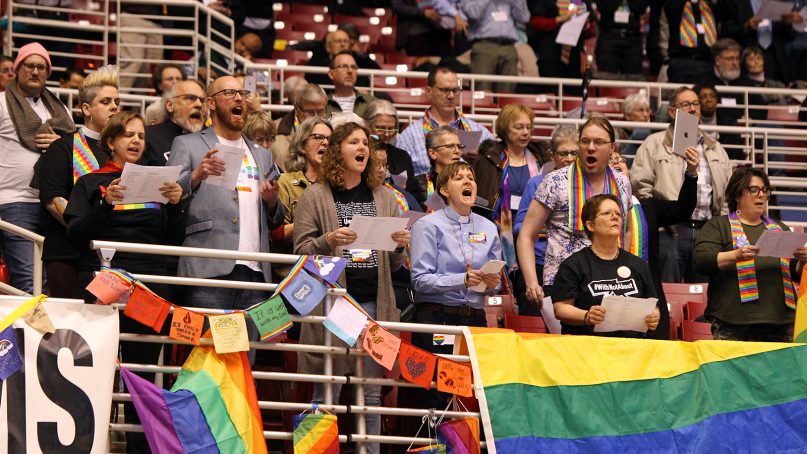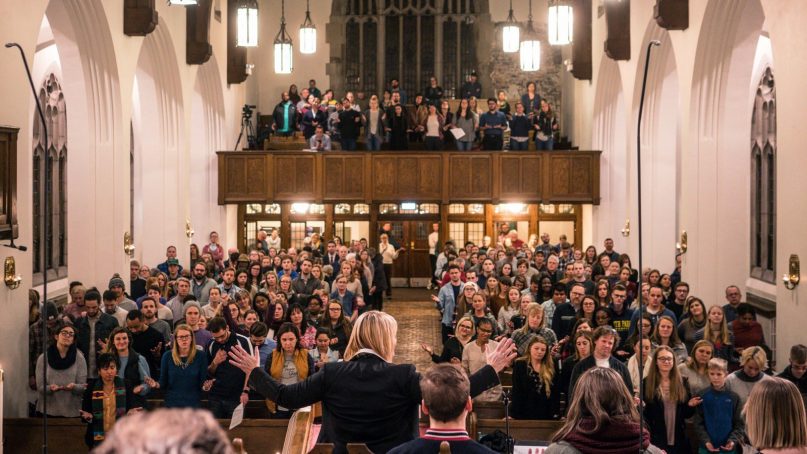CHICAGO (RNS) — I was recently fired from my job as a chaplain at a Christian university for officiating at a same-gender wedding of a former student and colleague.
I was fired because some within my church and my school were shocked that I could be so “scandalous.” Others quickly proclaimed the need to punish my act as treasonous and expel me, “the immoral brethren,” from the church. Still others have practiced the subtler religious art of shunning.
Even as a 48-year-old, heterosexual, married, white, privileged and resourced evangelical, I’ve found that “coming out” in full support of the LGBTQ+ community has been a brutal experience.
RELATED: Evangelical chaplain’s suspension intensifies denomination’s gay marriage debate
All of these responses could be expected from a religious community that believes that purity is the goal of Christian life and that holiness is a fragile condition that must be protected. For me, the goal is to help people know a God who left his privilege behind to put on skin and walk with people in the person of Jesus.
But either way, our disagreement is not nearly as harrowing as its impact on a gay teenager walking this road alone. And the next steps the church takes will have life-and-death consequences.

The Rev. Judy Peterson, center, officiates the wedding of Roel and Marcus Mason-Vivit in 2017. Photo by Jiho/Lilly Photography
Perhaps if you know more of my story, my sense of conviction and urgency will make more sense to you. I was a bit of a miscreant in my early days. I wasn’t the worst, but I was an intentional sinner. When I met Jesus, he invited me to dance with him, no questions asked. When he offered to let me stand on his shoes until I learned the steps, I knew this was the God for me.
I left my job at a bar and entered seminary before I could name all of the books of the Bible. In my second year of study, I felt called to learn how to walk with God, not just to walk with people who knew God. Confident of this calling, I set out to walk across the United States, to learn how to stay in step with this God who walks with people.
In the year it took to walk from Grayland Beach, Wash., to Key Biscayne, Fla., I learned that Jesus longs to walk with whoever is placed in his path, without preference or prejudice. I tried my best to override my own fears and biases to keep pace with this embracing God. I learned to love the fullness of God and to love the breadth of people and to just keep it simple.
As you might imagine, the evangelical church loved the stories that came out of my experience and I was soon lifted up as a model of someone who walked out her faith.
Over the following decade I preached extensively about this journey. All the while, my husband and I were on a different, painful road of losing 11 pregnancies. In a religious tradition that loves a good equation, my story no longer fit the church’s formulas so neatly. I wondered how long the church would continue to love my story.
But, if my sermons were now a bit more angsty, they still remained within evangelical parameters: God goes with us even on painful stretches of road. God will work with you to bring about what is good no matter what “detour” you’re walking through. Keep walking out your “20 miles” every single day, who knows, God might need you to come alongside someone else on their lonely stretch of road.

The Rev. Judy Peterson. Photo courtesy of North Park University
It was during this season that I took a job as the campus chaplain at my denominational university. It was there that I learned to “pastor-ent” — both pastor and stand in as a parent for young adults, often away from home for the first time or who had never experienced unconditional parental love. It was exactly the type of story I knew God authored: a childless parent paired up with “children” who wanted someone with whom to wrestle their way into adulthood.
While the university was a Christian school, it did not require students to sign a faith statement or commit to a conservative lifestyle. This meant that those who sat around my dining room table were not always traditional Christian kids. Many were exploring a Christian faith for the first time, and many identified as both Christian and gay. Like much of their generation, many were rightfully suspicious and significantly wounded.
I maintained the same standards for all my students: Honor God with your whole life, love your neighbor with your full self and keep your pants on. When you trip and fall, come see me and we’ll get you dusted off so together we can make another reasonable run.
I find it important to articulate this because people watching from a distance have wrongly accused me of not being clear about the standards of God, simply because I offer the grace of God. They say to me, “Scripture is very clear that Jesus said to sinners, ‘Go and sin no more.’” To this I will continue to respond, “Do you think they did?”
I believe everyone sins some more. And what do we believe Jesus does then? My experience has been that Jesus kneels down in the dirt with us time and time again, always encouraging us to get up and make another reasonable run.
This is the embodied grace that changed my life. It is this kind of embodied grace that I will continue to offer to people who will all sin some more.
This thorough and gracious embrace, especially of its LGBGTQ+ children, made my evangelical denomination increasingly uncomfortable. Many believed that simply being gay, and certainly being partnered as a gay person, was sinning some more. There were letters asking for my removal, petitions for churches to withdraw their financial support and increasing pressure for me to be clear that for the LGBTQ+ community, there was an additional requirement for inclusion in the evangelical church — a commitment to celibacy and singleness for the rest of their lives.
I saw firsthand the destruction that conditional embrace had caused. It often felt nearly impossible to love away the shame that so many carried. While I couldn’t keep everyone from ending their lives, I tried to create an environment where everyone would want to live. But I was up against a church that seemed to have so many kids it could afford to lose a few. Personally, I have lost too many to want to risk losing even one more life.

LGBTQ advocates react to the Traditional Plan being adopted at the United Methodist Church General Conference on Feb. 26, 2019, in St. Louis. RNS photo by Kit Doyle
I am not naive. I understand the full inclusion and blessing of partnered LGBTQ+ persons in the church is the issue of our day. I know that entire denominations are being torn at the seams and a significant portion of a generation has let go of the garment of the church altogether. I am not unaware of the tensions people find in the biblical text.
I wonder nonetheless how the church can continue to biblically defend its unwillingness to leave the 99 for the one. How can we claim to follow a God who left the purity of his privileged place to walk with the sinful and the marginalized, if we are unwilling to do the same?
How can we defend interpretations that tear people apart when Jesus broke a rule written in stone in order to make a brother whole? People of God, the Bible is not made of flesh and blood; it cannot be wounded, nor does it need a defender. But, according to Scripture, God’s vulnerable children need to know we are willing to stand with them.
I have made a reasonable run at trying to stay in step with the God I learned to walk alongside for 4,200 miles and who has walked alongside me through indescribable loss. I will continue to walk out the words I have proclaimed to tens of thousands of people — there is a God who wants to walk with us, a God who loves us without preconditions and in spite of our reputations.
I will continue to risk my reputation in the hopes of coaxing the church to take a more honest look at whether or not it truly wants to walk out what it preaches, that there is a God who came as good news of great joy for all people.
One would think a desire to remain true to such a core declaration wouldn’t be controversial at all. Yet my commitment to this good news has now led to losing my job and a battle with my denomination over whether or not theological dissent should be treated as a moral failing. This impasse has now led me to give up my ministerial credentials so that I can continue to boldly walk out my conviction that when we say there is good news for all, we mean all. Who knew practicing what we preach could be so scandalous.
(Pastor Judy Peterson, a member of the Evangelical Covenant Church, is the former chaplain at North Park University. The views expressed in this commentary do not necessarily represent those of Religion News Service.)





